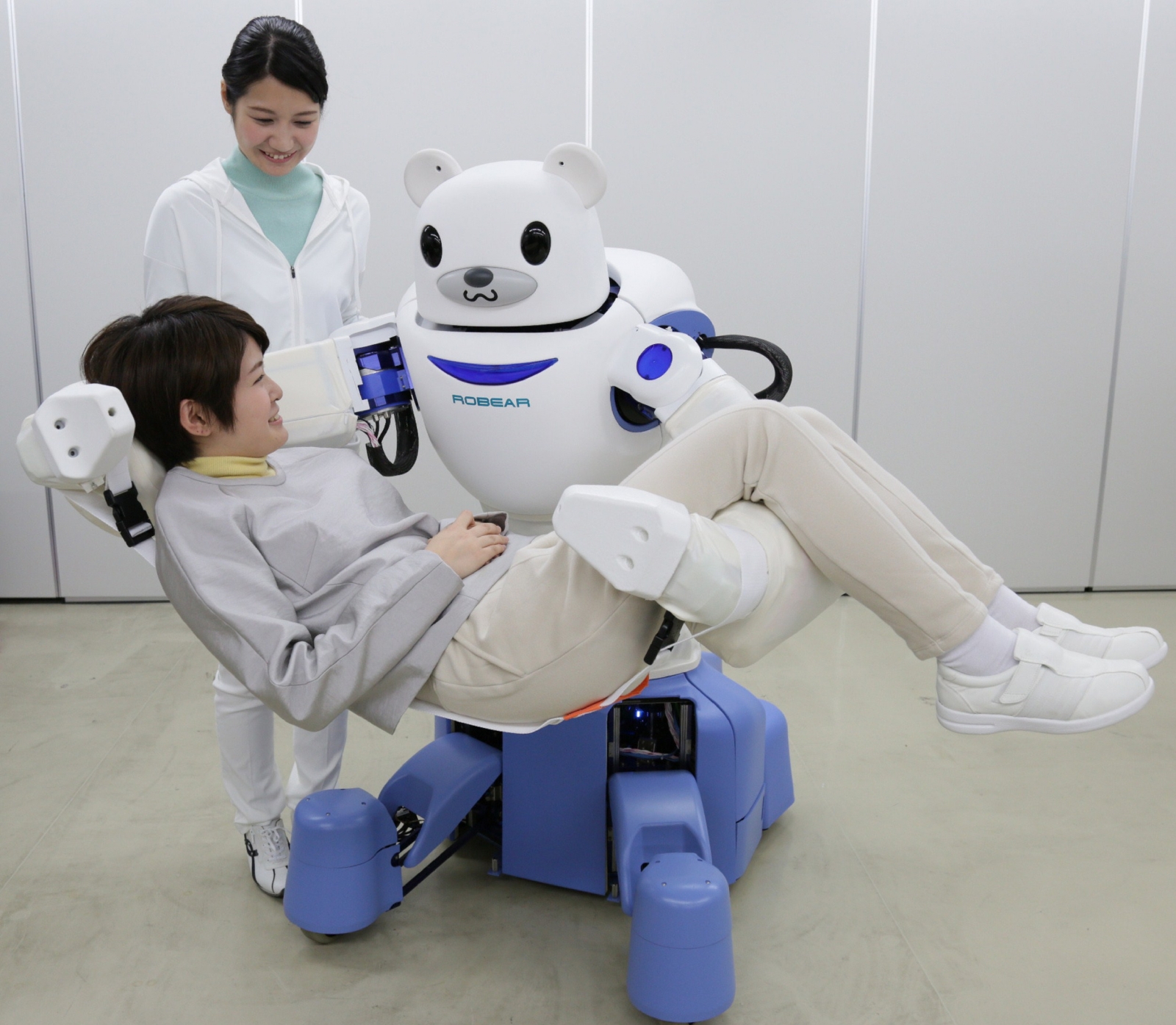
Imagine you are being massaged by the smoothest of hands. They knead and rub your back like an angel, working out the knots from a lifetime of stress. Then these hands carefully flip you over, and help put on your clothes. You are offered a sip of juice, and asked if you would like assistance in walking to the bathroom.
It might seem ridiculous right now, but in this vision your divine golden years’ assistant is actually a robot. And in Japan this is not a vision at all, robot nursing home attendants have arrived.
“The polar cub-like look is aimed at radiating an atmosphere of strength, geniality and cleanliness at the same time,” a research team leader said of a robot named ROBEAR. “We really hope that this robot will lead to advances in nursing care, relieving the burden on care-givers.”
ROBEAR is actually the third in the line of bear-faced robots produced by RIKEN, a large Japanese research institution—first was RIBA, then RIBA-II. According to a 2015 CNET article, ROBEAR is intended to be able to, “lift and carry a mobility impaired patient, or help them stand and provide a support to lean on while walking.”
Given Japan’s technologically advanced society and the country’s love for shiny cute things, it seems fitting that the nation to break the robot nursing home ice would be Japan. But there are other reasons why Japan is first on this frontier. Presently, about a quarter of Japan’s population is over 65, and more and more the elderly are living alone.
“There is a kind of myth that older people in Japan are living in three-generational families, but that’s not so anymore,” Ochanomizu University gerontologist Takako Sodei told me in 2010, when I reported an article for TIME on the issue of lonely deaths in Japan.
Another part of the problem, the Japanese are having fewer and fewer children. I remember when I was in Japan, people said the issue had become such a problem that certain companies were promoting company mixers just to get people meeting, and copulating.
There are even more dire manifestations of the problem. If the present birthrate continues, shortly after the dawn of the next millennium—in the year 3011—the last Japanese child will be born, and eventually die. “The overall trend,” economics professor Hiroshi Yoshida told the AFP in 2012, “is toward extinction.”
An even more troubling way to illuminate the trend lies in toiletry products. “In 2012, toiletries company Unicharm said that sales of its adult diapers ‘slightly surpassed’ baby diapers for the first time since the company moved into the elderly market in 1987,” reported a recent article in MentalFloss.
And even the country’s President, Shinzo Abe, has taken notice of the issue. “If the birthrate remains at the current level, Japan’s population [presently about 127 million] will be about 80 million in 50 years, and 40 million in 100 years,” Abe announced last year, in setting up a panel to address the crisis.
Robots might be the solution to the problem, but they come with their own problems too.
It’s not easy to design technology that understands when a fragile elderly person flinches or doesn’t want to be picked up out of a hospital bed, RIKEN researcher Dr. Toshiharu Mukai explained.
And a video of the ROBEAR is fun, but doesn’t necessarily sell the product. The ROBEAR is seen slowly and awkwardly reaching its fingerless hands out to hug someone.
Still, the trend already appears to be spreading to other countries, including the United States. “As these technologies have developed in Japan, foreign companies have embraced them as well,” reads an article in GOOD. “In part, these firms are recognizing…how profitable the eldercare robotics market could be.”
By 2050, the number of Americans age 65 or older is predicted to nearly double, from around 45 million, to 83.7 million, according to a U.S. Census report.
Researchers at Intel and Carnegie Mellon University have developed the “Home Exploring Robotic Butler,” a prototype robot butler intended to help the elderly with cooking, cleaning and other household chores. Apparently, HERB, as the robot is known, can even twist apart an Oreo.
And then there is Cody, a robotic nurse developed by a team at the Georgia Institute of Technology and designed to give baths to the elderly. The robot, “is programmed to apply gentle pressure while washing a patient,” says the HuffingtonPost, “as a solution…to the embarrassment of receiving bathing help from another human.”
Having a robot take care of you in old age may not seem appealing, but it appears to be where the world is heading. Meanwhile, in Japan, the fascination for robotics may be taking a new turn, one that could help solve the country’s birthrate crisis. Meet Yotaro, the robot baby.









